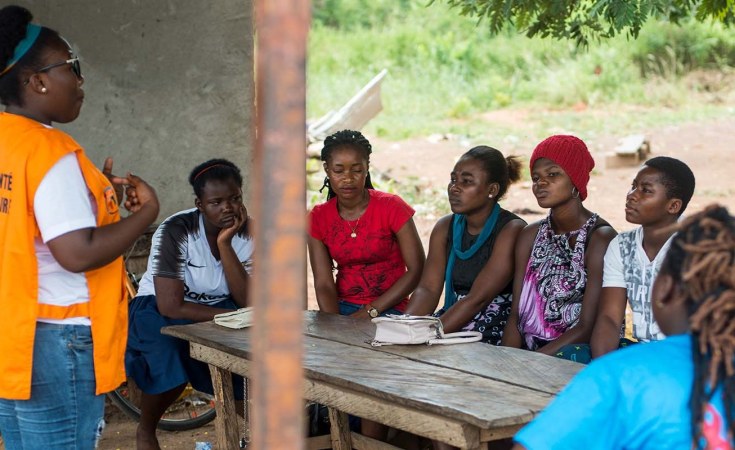APRIL 19, 2024

Image by Hennie Stander.
Let us stop to smile at the ridiculousness of The New York Times’ rightmost columnist Ross Douthat.
A recent Douthat piece is titled “Can the Left Be Happy?” It accuses “the [US] left” of being intrinsically despondent, discontented and pessimistic.
Douthat pins his argument mainly on the leftish Black author Ta-Nehesi Coates’ following pessimistic statement in The Atlantic eleven years ago: “I don’t believe the arc of the universe bends towards justice…I don’t even believe in an arc. I believe in chaos … I don’t know that it all ends badly. But I think it probably does.”
“In this [Coates’] crisis of faith,” Douthat claims. “you see the question that has hung over left-wing culture throughout a period in which its influence over many American institutions has markedly increased: Does it make any sense for a left-winger to be happy?”
Douthat also cites a review essay in which the childhood psychology scholar Candice L. Odgers dared to suggest that rising youth depression might to be related to “guns, exposure to violence, structural discrimination and racism, sexism and sexual abuse, the opioid epidemic, economic hardship and social isolation.”
The Catholic reactionary Trump apologist Douthat claims that “the left” is “by nature, unhappier than the moderate and conservative alternatives. The refusal of contentment is essential to radical politics…”
Douthat relates this alleged left unhappiness to the implosion of what he considers “the 20th century left’s” two sources of optimism: “the Christianity of the American social gospel tradition, which influenced New Deal liberalism and infused the civil rights movement, and the Marxist conviction that the iron logic of historical development would eventually bring about a secular utopia — trust the science (of socialism)!” Further:
‘What’s notable about the left in the 2020s is that neither anchor is there anymore. The secularization of left-wing politics has made the kind of Christian-inflected cosmic optimism that still defined, say, Barack Obama’s 2008 campaign seem increasingly irrelevant or cringe-worthy. Meanwhile, the revival of Marxism and socialism has not been accompanied by any obvious recovery of faith in a Marxist science of history. I know many people on the left who think Marx was right about capitalism’s contradictions; I know many fewer who share his expectation that the dialectic will yield a worker’s paradise…Instead you have a fear that when ‘late capitalism’ crashes, it will probably take everybody down with it, a sense we should be ‘learning to die’ as the climate crisis worsens, a belief in white supremacy as an original sin without the clear promise of redemption.’
Good grief. Where to begin in picking through this childish drivel?
Douthat is laboring under eight wrongheaded notions.
His first mistake is to believe that there is any cohesive political and intellectual formation that can be reasonably be called “the left” in the United States. Where is this mysterious entity that Trump and his party keep railing about – “the Left?” Do we have a big seriously “radical” Socialist party or movement actually contending for power in the United States right now? (Where do I sign up? Hello?)
Douthat’s reference to the arch-neoliberal Barack Obama’s 2008 campaign suggests that he follows the Republi-fascist party and movement in absurdly casting his net to widely as to include Obama and the rest of the militantly capitalist-imperialist Democratic Party in his notion of “the Left.”
Douthat’s second incorrect notion is that “left-wing culture” has recently “markedly increase its influence over many American institutions.” He is living in a Trumpian fantasy world if he seriously believes this. My best guess is that he is referring here to the bourgeois- identitarian “diversity” and “PC” culture that is evident in workplaces, schools, media, and the militantly capitalist-imperialist Democratic Party – and to the fact that a small number of Democratic elected officials (Bernie Sanders and AOC above all) vaguely identify as “socialists.” Whatever.
Douthat’s third error is to oddly spotlight the pessimist Ta-Nehesi Coates as the epitome of “the left.” The actual leftist Cornel West broke down the absurdity of this identification seven years ago:
‘Ta-Nehisi Coates and I come from a great tradition of the black freedom struggle. He represents the neoliberal wing that sounds militant about white supremacy but renders black fightback invisible. This wing reaps the benefits of the neoliberal establishment that rewards silences on issues such as Wall Street greed or Israeli occupation of Palestinian lands and people…The disagreement between Coates and me is clear: any analysis or vision of our world that omits the centrality of Wall Street power, US military policies, and the complex dynamics of class, gender, and sexuality in black America is too narrow and dangerously misleading. So it is with Ta-Nehisi Coates’ worldview… Coates fetishizes white supremacy. He makes it almighty, magical and unremovable. What concerns me is his narrative of “defiance”. For Coates, defiance is narrowly aesthetic – a personal commitment to writing with no connection to collective action. It generates crocodile tears of neoliberals who have no intention of sharing power or giving up privilege…When he honestly asks: “How do you defy a power that insists on claiming you?”, the answer should be clear: they claim you because you are silent on what is a threat to their order (especially Wall Street and war). You defy them when you threaten that order….Coates tries to justify his “defiance” by an appeal to “black atheism, to a disbelief in dreams and moral appeal”. He not only has “no expectations of white people at all”, but for him, if freedom means anything at all it is “this defiance”…Note that his perception of white people is tribal and his conception of freedom is neoliberal. Racial groups are homogeneous and freedom is individualistic in his world. Classes don’t exist and empires are nonexistent.’
Douthat’s fourth mess-up is that his charge of pessimism dangerously diverts attention away from what capitalism (and its related and overlapping oppression structures, systems, and practices of imperialism, racism, and sexism) are in fact doing to the world: potentially ending all prospects for a decent future with runaway climate change, environmental ruination more broadly, potentially nuclear global war, pandemicide, and the the growing political pathology of fascism. Do we charge doctors who properly diagnoses lethal ailments and diseases with pessimism, preferring not to provoke fear and sadness in patients and their loved by telling them what is causing their ill-health? Shall we forbid book titles like Ill Fares the Land (both the late Tony Judt and Susan George have written left books with that title) when the land is in fact unnecessarily faring ill, courtesy of capitalism-imperialism?
Douthat’s fifth mistake is to reflexively identify one’s scientific understanding of what capitalism and racism (and imperialism, sexism, nativism, nationalism, and fascism) are in fact doing to the world, including yes the climate, with pessimism and unhappiness. For myself and for other actual radical socialists and communists I know, it is a pleasing, hopeful, and even optimistic activity to communicate and struggle with others about what’s really happening in a world under the control of imperial capital. We believe that our fellow humans can grasp and act on that knowledge in the process of building a movement for a revolutionary socialist order that can put humanity on the path to a world beyond all exploitation, oppression, and injustice. We think revolution and another world are possible. Imagine that!
(I am no fan of the dysfunctional maxim that too many Marxians like to quote from the imprisoned 1920s Italian communist Antonio Gramsci: “pessimism of the mind, optimism of the will.” Anyone who thinks mental pessimism doesn’t fuel spiritual and activist discouragement and inertia is out of touch with basic mind-body research, lived human experience, and natural intelligence. It’s a stupid, self-cancelling aphorism that should be dropped on “the left.”)
Douthat’s sixth mistake is to over-identify one’s personal happiness with one’s understanding of the world outside oneself. Many of us actual radical leftists can combine a sense that capitalism is actively ruining life on Earth – that’s just a material fact – with continuing to play and party and enjoy friendships and/or romance, exercise, pets, music, philosophy, good food, sports, painting, and the delight of children.
Douthat’s seventh mistake is to noxiously suggest that there’s something wrong with unhappiness. Sadness and depression are natural parts of life and learning how to process and develop through darkness is part of an authentic existence, without a neurotic smile painted on one’s face to meet social expectations. Given the many epic tragedies and grave menaces afoot today, symptoms mainly of the capitalist-imperialist order, one has to wonder about the moral, intellectual and spiritual health of anyone who doesn’t experience considerable moments of real sadness and depression.
And, for what it’s worth, the people most prone to their politics sparking unhappiness that I have met in this country are on the Republi-fascist right: they fuss and fume about the mythical great power of the purported “radical Left” “deep state” that is supposedly “stealing our elections and our country,” collapsing our “European culture,” fueling rampant “inner-city crime,” and “replacing” whites with nefarious dark-skinned immigrants, etc.
Douthat’s eighth screw-up is to pretend that he knows anything much about “the Marxist science of history.” Douthat’s notion that a significant portion of “the left” is depressed/pessimistic because the “Marxist science of history” has not been borne with the fulfilment of Marx’s “expectation that the dialectic will yield a worker’s paradise” is flawed in three key ways.
First, despite Douthat’s odd reference to “the revival of Marxism,” only a small part Douthat’s mysterious “The Left” is Marxist in any serious and scientific way.
Second, while Marx and his comrades and followers had plenty of reasons to think that the “dialectical expectation” of proletarian revolution would be borne out in the late 19th Centuries and perhaps during and after World War One, no serious Marxist in 2024 thinks that iron laws of history make socialist revolution inevitable. That’s essentially a religious, faith-based thing to believe.[1]
Third, the science that is Marxism does not remotely depend on the fulfillment of the dialectical prophecy. Disillusioned ex-radicals who claim that Marxism is invalidated by the “failure of the proletariat to rise up against capital” have missed the most enduring and relevant points in Marx. Marx’s core historical-materialist discovery was that, as Engels explained in 1888, “In every historical epoch, the prevailing mode of economic production and exchange, and the social organization necessarily following from it, form the basis upon which is built up, and from which alone can be explained, the political and intellectual history of that epoch.” Each historical period combines an underlying mode of production (combining technical forces with distinctive social relations of production) with an overlaying political and ideological superstructure both serving and conditioned by that mode of production.
Look at Engels’ speech at Marx’s gravesite in Highgate Cemetery in 1883:
‘On the 14th of March.., the greatest living thinker ceased to think…An immeasurable loss has been sustained both by the militant proletariat of Europe and America, and by historical science, in the death of this man. The gap that has been left by the departure of this mighty spirit will soon enough make itself felt…Just as Darwin discovered the law of development of organic nature, so Marx discovered the law of development of human history: the simple fact, hitherto concealed by an overgrowth of ideology, that mankind must first of all eat, drink, have shelter and clothing, before it can pursue politics, science, art, religion, etc.; that therefore the production of the immediate material means, and consequently the degree of economic development attained by a given people or during a given epoch, form the foundation upon which the state institutions, the legal conceptions, art, and even the ideas on religion, of the people concerned have been evolved, and in the light of which they must, therefore, be explained, instead of vice versa, as had hitherto been the case.
But that is not all. Marx also discovered the special law of motion governing the present-day capitalist mode of production, and the bourgeois society that this mode of production has created. The discovery of surplus value suddenly threw light on the problem, in trying to solve which all previous investigations, of both bourgeois economists and socialist critics, had been groping in the dark.
Two such discoveries would be enough for one lifetime. Happy the man to whom it is granted to make even one such discovery. But in every single field which Marx investigated — and he investigated very many fields, none of them superficially — in every field, even in that of mathematics, he made independent discoveries. Such was the man of science. But this was not even half the man. Science was for Marx a historically dynamic, revolutionary force. However great the joy with which he welcomed a new discovery in some theoretical science whose practical application perhaps it was as yet quite impossible to envisage, he experienced quite another kind of joy when the discovery involved immediate revolutionary changes in industry, and in historical development in general. For example, he followed closely the development of the discoveries made in the field of electricity and recently those of Marcel Deprez.
For Marx was before all else a revolutionist. His real mission in life was to contribute, in one way or another, to the overthrow of capitalist society and of the state institutions which it had brought into being, to contribute to the liberation of the modern proletariat, which he was the first to make conscious of its own position and its needs, conscious of the conditions of its emancipation. Fighting was his element. And he fought with a passion, a tenacity and a success such as few could rival. His work on the first Rheinische Zeitung (1842), the Paris Vorwarts (1844), the Deutsche Brusseler Zeitung (1847), the Neue Rheinische Zeitung (1848-49), the New York Tribune (1852-61), and, in addition to these, a host of militant pamphlets, work in organisations in Paris, Brussels and London, and finally, crowning all, the formation of the great International Working Men’s Association — this was indeed an achievement of which its founder might well have been proud even if he had done nothing else.’
See any mention of inevitable proletarian revolution as fundamental to Marxism as science in the eulogy penned by the thinker and ally who knew him best? You do not. And indeed, contrary to the notion of Marxism as inevitable-ism, Engels noted that Marx spent much of his life trying to bring his own (de-classed) bourgeois background to the fore of helping make socialist revolution with his own human agency. Why spend much of your life agitating for socialism and communism if you see them as inevitable?
Both of the scientific discoveries that Engels righty attributed to 141 years ago – (a) historical eras rooted in modes of productions topped by political and ideological superstructures and (b) surplus value and contradictory laws of motion under capitalist political economy – are as relevant today as ever.
I’m not happy to observe that we continue to suffer under the cancerous contradictions of the capitalist era but I happily retain faith in revolutionists’ continuing ability to help people see and fight through and past these contradictions – to “contribute, in one way or another, to the overthrow of capitalist society and of the state institutions which it had brought into being, to contribute to the liberation of the modern proletariat” and the emancipation of humanity.
This essay previously appeared on The Paul Street Report
Note
1. For an excellent critique of “inevitable-ism,” “class truth,” and other forms of religious, fetishist, subjectivist, partisan, irrational, anti-scientific and anti-revolutionary belief in “Marxist,” “communist,” and postmodern thought, see Ishak Baran and KJA, “Ajith: A Portrait of the Residue of the Past,” Demarcations – A Journal of Communist Theory and Polemic (December, 2014).









